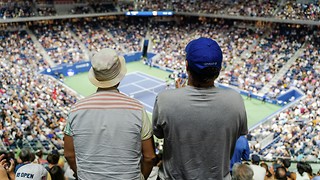Commentary Box: Rise of the back row
Sam Oakley discusses the increasing influence of the back row in rugby

Following the Australia-South Africa quarter-final of this year’s Rugby World Cup, a Facebook page was established. It called for Bryce Lawrence, the Kiwi referee who took charge of that match, to ‘never be allowed to referee a game of rugby again’. To date, the page has more than 84,000 ‘likes’.
Lawrence’s performance had been risible. His inability to establish any control over the Australian back row, particularly David Pocock, was disgraceful. This was a match in which the Springboks had 76% of possession, yet were turned over nine times by an Australian team which dived off its feet, which refused to release in the tackle, and which used its hands on the floor – all wantonly, to all of which Lawrence remained oblivious.
Lawrence did more, however, than enrage the South African sporting nation; he epitomised the substandard nature of arbitration at this year’s World Cup, the critical areas of which came at rugby’s most contentious yet cherished point, the breakdown.
Look at the final. Craig Joubert seemed unable to penalise Richie McCaw, the greatest of cheats, for coming in from the side and killing the ball off his feet. Worst, though, with three minutes left, was the missed offside with the French in an eminently kickable position.
The ruck is fundamental to rugby union: it makes the game unique, and dominance in this area will invariably result in victory. Consequently, refereeing the ruck is vital in establishing which team has the upper hand going forward. Getting this wrong, you get the game wrong. However, is this all the fault of the referees?
Likely not – this World Cup has demonstrated that international back-rows have become stronger and more devious than ever. No matter how the IRB may tinker with the laws, referees remain at the mercy of the loose forwards. Increasingly so, because having a back-row who can slow down ball, kill opposition momentum, who in some games can make more tackles than an entire team, who can carry, and who can steal opposition ball, is now the means to victory in international rugby.
Indeed, look at RWC 2011 – this was the tournament of the flanker. Its enduring image may be McCaw lifting the cup, but the performance of Thierry Dusatoir in the final will never be forgotten. He singlehandedly carried his team to the brink of greatness.
Across the board, too, it was the flanker who dominated. The horror of Welsh fans when Sam Warburton was dismissed in the semi-final was proof of his importance to their team. In Sean O’Brien, Ireland will have a world-class blindside for years to come. For the Springboks, Broussow and Burger – though entirely different players – have established such places in the pantheon that even Willem Alberts cannot force his way into the starting team. Even emerging nations have class in their back row: Gorgodze of Georgia was many observers’ pick of the group stages, while Namibian skipper Jacques Burger carried his form for Saracens onto the global stage.
So while we may carp at the incompetence of Lawrence, Joubert, et al, we might look more at the deviance which they must police. For as long as back rows improve, for as long as they bend the rules to their limit, the referee is only as influential as the back row itself.
 Features / The community Cambridge accommodation creates (and doesn’t)9 August 2025
Features / The community Cambridge accommodation creates (and doesn’t)9 August 2025 News / Trinity sells O2 Arena lease for £90m12 August 2025
News / Trinity sells O2 Arena lease for £90m12 August 2025 Lifestyle / An ode to college accommodation11 August 2025
Lifestyle / An ode to college accommodation11 August 2025 Sport / ‘A full-time job with overtime’: should disparities change the way we approach Bumps?6 August 2025
Sport / ‘A full-time job with overtime’: should disparities change the way we approach Bumps?6 August 2025 Features / Incoming freshers and their hopes, fears and expectations for Cambridge 12 August 2025
Features / Incoming freshers and their hopes, fears and expectations for Cambridge 12 August 2025









